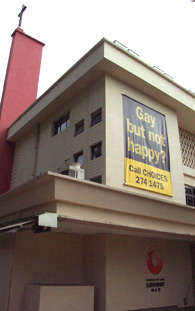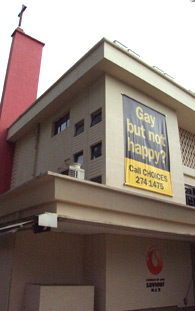Singapore's Anglican Bishop Dr John Chew Hiang Chea, has called homosexuality a 'phenomenon' when asked by a local newspaper reporter what the united response of the National Council of Churches of Singapore was. The council, which reportedly met last Thursday, is expected to issue a statement in response to the growing debate surrounding the government lifting its ban on employing gays and the place of gay and lesbians in Singapore society.

A Choices banner prominently displayed outside Church of Our Saviour in Singapore.
When asked by the newspaper what the response of the council was, Dr Chew, who is also one of the recipients of the letter, declined to give answer but said that "on the whole, churches have a common perspective" on the issue.
Commenting on some of the churches active lobbying against homosexuality, Dr Chew said: "As concerned citizens we have a duty to make known our beliefs and concerns, nothing more, nothing less. We are aware that the gay lobby is also pushing hard."
"The phenomenon of homosexuality is not compatible with the reading of the scriptures," said Dr Chew, the head of the Anglican Diocese of Singapore, which consists of 25 parishes in Singapore and 6 deaneries in Cambodia, Indonesia, Laos, Nepal, Thailand and Vietnam.
The letter, which was signed by six "Christians who happen to be gay," asked for "friendly and respectful dialogue" despite the difference in views.
Part of the letter read: "The current polarising polemical approaches taken by some of the churches under your authority are not helpful to fostering healthy theological debate within a reasoned and Christ-like environment."
Ms Peggy Koh, one of the signatories to the letter, said that what the contents of the letter represents the views of many gay Christians.
"Basically we see a lot of negative reaction from a lot of churches with regard to what PM Goh said (about the government hiring gay people)… The whole idea is not to hype the issue but to be conciliatory, have a civilised discussion. A lot of negative reaction boils down to ignorance, so let's all be open-minded," she said.
In the recent weeks, some churches have been up arms, saying that homosexuality has detrimental effects on the social fabric.
One such group, the Church Of Our Saviour (COOS), which also runs Choices, a Christian ex-gay ministry that helps people 'overcome' homosexuality, has widely circulated two articles challenging the scientific notion of being born gay, which Singapore's Prime Minister Goh Chok Tong has supported.
"Born Gay? There Is No Scientific Proof", one of the two letters which are also available on the church's website reads in part: "In our work, we know that the homosexual condition is changeable. The cause for homosexuality is developmental in nature (eg. inadequate same-sex parenting, weak model for gender identification, sexual abuse and experimentation etc.) Just as paedophiles do not have a master gene that makes them sexually attracted to children, homosexuals are also not genetically programmed to have same-sex attractions."

A Choices banner prominently displayed outside Church of Our Saviour in Singapore.
According to the American Psychological Association (APA), no scientific evidence exists to support the effectiveness of any therapy that attempts to convert homosexuals into heterosexuals.
"For nearly three decades, it has been known that homosexuality is not a mental illness. Medical and mental health professionals also now know that sexual orientation is not a choice and cannot be altered. Groups who try to change the sexual orientation of people through so-called `conversion therapy' are misguided and run the risk of causing a great deal of psychological harm to those they say they are trying to help," said American Psychological Association Executive Director Dr Raymond Fowler.
In August 1997, the American Psychological Association overwhelmingly passed a resolution, at the APA convention, that asserts that there is no sound scientific evidence on the efficacy of "reparative therapy," which seeks to "cure" homosexuals. In 1973, the American Psychiatric Association removed homosexuality from its list of mental disorders.
The American Psychiatric Association says: "There is no published scientific evidence supporting the efficacy of reparative therapy as a treatment to change one's sexual orientation. Gay men and lesbians who have accepted their sexual orientation positively are better adjusted than those who have not done so."
Meanwhile, leading Anglican conservatives in the US have threatened a "dramatic realignment" of the worldwide church on Wednesday if the Episcopal Church, the U.S. member of the global Anglican Communion, were to approve same-sex blessings and confirm the election of their first openly gay bishop.
Although the bishops from Africa, South America, Southeast Asia and the Caribbean would not say what action they would take if the Episcopal Church votes to take those steps at its General Convention starting July 30, they had indicated that they will move to separate themselves from individual dioceses that tolerate homosexuality, reports the Associated Press.
